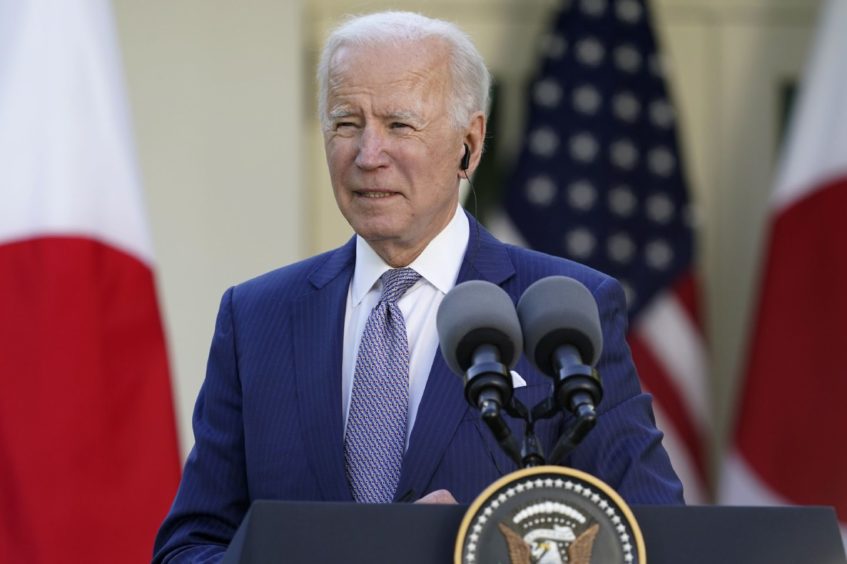
World leaders will take part in a virtual global summit on climate change this week as US President Joe Biden leads a new push to cut emissions.
Mr Biden has invited 40 leaders to take part in the two-day summit starting on Earth Day, April 22, to galvanise efforts by major economies to combat climate change ahead of key UN talks hosted by the UK this year.
Ahead of the summit, Washington and Beijing announced in a joint statement issued by the US State Department they had reached an agreement to cooperate with each other and with other countries to “tackle the climate crisis, which must be addressed with the seriousness and urgency that it demands”.
The US has been engaged in intense diplomatic efforts to encourage major polluters to bring forward more ambitious targets to cut the emissions which are pushing up global temperatures.
Those efforts led to climate envoy and former secretary of state John Kerry striking the agreement with China, which has raised hopes that countries such as Japan and Canada will be announcing new moves to slash pollution.
Ultimately though, the world’s eyes will be firmly on the action the US itself can deliver, with expectations high on America’s plans for cutting emissions over the next decade.
The Biden administration will be putting forward new plans as part of its recommitment to the Paris climate accord, the world’s first comprehensive climate treaty which Donald Trump quit when he was president.
Countries have been expected to come forward with more ambitious plans up to 2030, known as nationally determined contributions (NDC) in the Paris deal, ahead of the Cop26 climate summit in Glasgow in November.
That is because existing plans are not enough to meet countries’ commitments under the Paris deal to curb global temperature rises to 1.5C above pre-industrial levels and avoid the worst impacts of climate change.
The UK has put forward plans to cut greenhouse gas emissions by at least 68% on 1990 levels by the end of the decade.
Ahead of the summit, environmental organisations, scientists and key figures in the climate movement have called for the US to cut its emissions by at least 50% on 2005 levels by 2030.
Jamal Srouji, associate at the US-based research organisation World Resources Institute, said a 50% cut would be achievable and ambitious.
And he said: “The expectations will be very high on the US as hosts of the summit, especially after four years of absence at the federal level, to demonstrate leadership through its ambitious NDC and to encourage others to come forward with also ambitious targets.”
He said the summit comes as a stepping stone to other events through the year, such as the G7 meeting of leading economies, in the run-up to Cop26 and could kickstart action on issues that need to be addressed by the November meeting.
It would be a real test of US international climate leadership, and define how and whether major powers were ready to work together on the issue, he said.
Finance to help developing nations – many of whom are among the most vulnerable to climate change and the least responsible for pollution – adapt to the impacts of climate change and develop their economies cleanly will also be a key issue.
Mr Srouji said: “We’re looking for developed rich nations to ramp up their finance commitments.
“That is really essential for developing countries who, if they are to decarbonise their economies, will need financial packages that are going to help green some of their sectors.
“This is quite crucial, especially for developing countries, they are very much looking forward to this summit to get a first sense of how climate finance is going to play out ahead of Cop.”
Manuel Pulgar-Vidal, WWF global lead on climate and energy, said the summit must unlock the political will needed to ensure a successful outcome at Cop26.
“We are running out of time. The overriding quest by leaders must be to catalyse efforts that keep the 1.5C goal within reach.
“They must commit to tangible actions that spur the transformational change needed to halve global emissions by 2030.”
He warned that would not be possible without the finance to implement the plans and called on the world’s richest countries – who represent 75% of global emissions – to do their fair share.
Amber Rudd, former UK energy and climate change secretary who led the UK delegation at the talks in Paris in 2015 which secured the global treaty, said international action to climate change was strong and growing.
“But it is critical now that we press on urgently,” she said.
“That is the job of the UK Cop26 presidency, working with the US and other leaders – to build momentum through the US summit and G7 meetings, to Glasgow and beyond, to achieve the Paris goal of keeping warming to 1.5C,” she said.
Recommended for you
